Sara Vogel, Ph.D, Urban Education
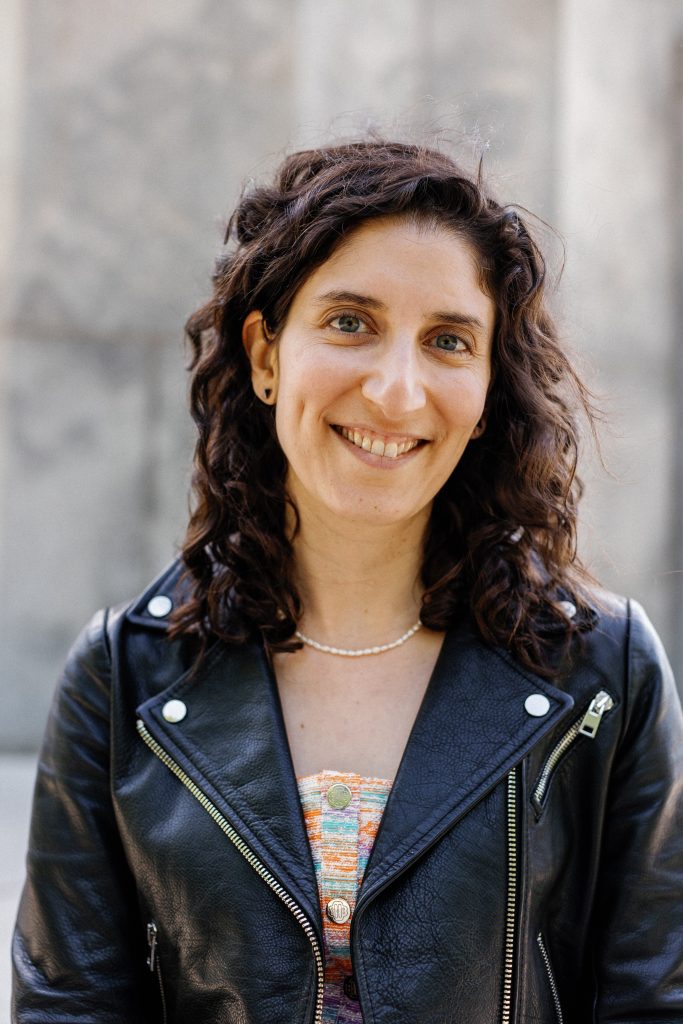
Dr. Sara Vogel is a born-and-raised Brooklynite, educator, and education researcher focusing on computing-integrated learning environments and forms of teacher education that center bi/multilingual learners, their literacies, and communities. She is currently the Research Director of the City University of New York – Computing Integrated Teacher Education (CITE), a four-year, $14 million initiative to support CUNY faculty to prepare educators to equitably and meaningfully integrate computing and digital literacies into public school classrooms, where she leads faculty professional learning and research.
Prior to joining the CUNY CITE team, she was faculty in the Teaching of English to Speakers of Other Languages (TESOL) residency program at Bank Street College and an Associate Research Scientist at New York University with the National Science Foundation funded project, Participating in Literacies and Computer Science (PiLa-CS), which supports bi/multilingual students to participate in Computer Science for All initiatives. A former bilingual teacher and practitioner of innovative digital “out-of-school-time” programs for youth, she has a PhD in Urban Education from the Graduate Center of the City University of New York.
Education Research and Practice Highlights
Translanguaging
My scholarship and pedagogy are informed by translanguaging theory (García & Li Wei, 2014), which I take up as a scholar, practitioner, and teacher-educator.
Equitable Computing (Teacher) Ed
My work pushes stakeholders to ask “CS for What?” and to deliberate around collective values and justice-oriented frameworks to promote equitable computing-integrated (teacher) education.
Bi/multilingual CS Literacies
I co-founded Participating in Literacies and Computer Science (PiLa-CS), an NSF-funded research-practice partnership to support bi/multilingual learners in CSed.
Translanguaging
Grappling with Theory
Vogel, S. (2022). Attending to and transforming power dynamics in translanguaged research relationships and methodology. Research Methods in Applied Linguistics, 1(3), 100021. https://www.sciencedirect.com/science/article/pii/S2772766122000180
Vogel, S., & García, O. (2017). Translanguaging. In G. Noblit & L. Moll (Eds.), Oxford Research Encyclopedia of Education. Oxford University Press.
Vogel, S., Ascenzi-Moreno, L., & García, O. (2018). An Expanded View of Translanguaging: Leveraging the Dynamic Interactions Between a Young Multilingual Writer and Machine Translation Software. In J. Choi & S. Ollerhead (Eds.), Plurilingualism in Teaching and Learning: Complexities Across Contexts (pp. 89–106). Taylor & Francis Ltd. https://academicworks.cuny.edu/cgi/viewcontent.cgi?article=1494&context=gc_pubs
Resources for Practitioners

Teaching Bilinguals (Even if You’re Not One) A CUNY-NYSIEB Video Web Series
I produced this webseries in 2016-17 to share compelling examples of how teachers can draw on bi/multilingual students’ translanguaging practices. Used for teacher preparation across the US and around the world.
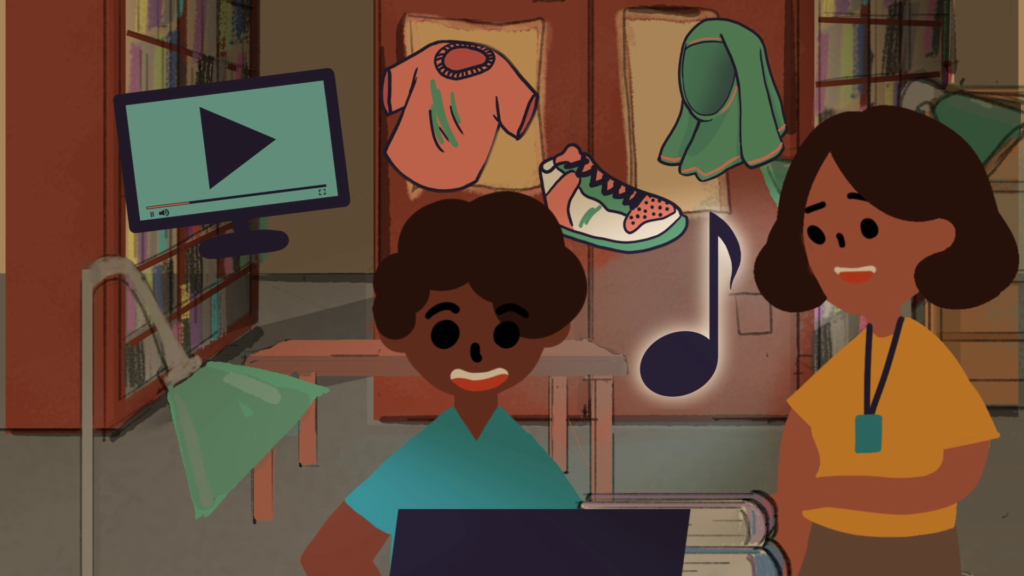
Translanguaging and Writing
Espinosa, C., Ascenzi-Moreno, L., & Vogel, S. (2016). A Translanguaging Pedagogy for Writing: A CUNY-NYSIEB Guide for Educators. CUNY- New York State Initiative on Emergent Bilinguals.
Equitable Computing (Teacher) Ed
Empirical and Theoretical Foundations
Vogel, S., Santo, R., & Ching, D. (2017). Visions of computer science education: Unpacking arguments for and projected Impacts of CS4All initiatives. Proceedings of the 47th ACM Technical Symposium on Computing Science Education.
Vogel, S., Yadav, A., Phelps, D., & Patel, A. (2024). Entry Points for Integrating Computing and Tech into Teacher Education: Addressing Problems and Opportunities with the EnCITE Framework. Journal of Technology and Teacher Education, 32(2). https://www.learntechlib.org/primary/p/223851/
Resources for Practitioners
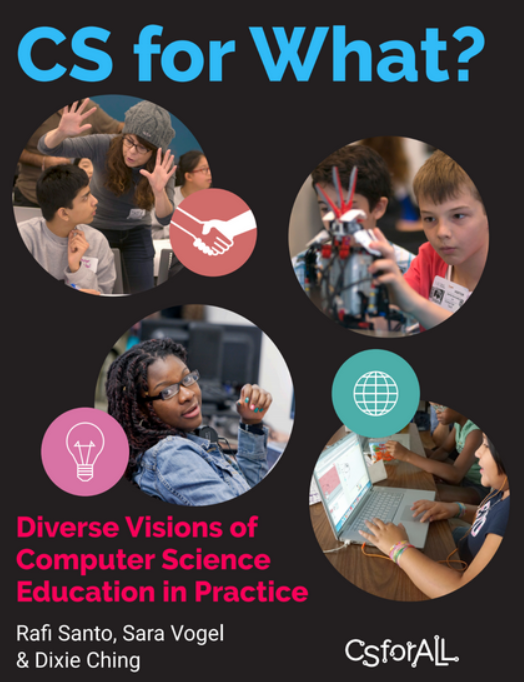
Santo, R., Vogel, S., & Ching, D. (2019). CS for What? Diverse Visions of Computer Science Education in Practice. CS for All.
CS Visions Framework Website at CS for All
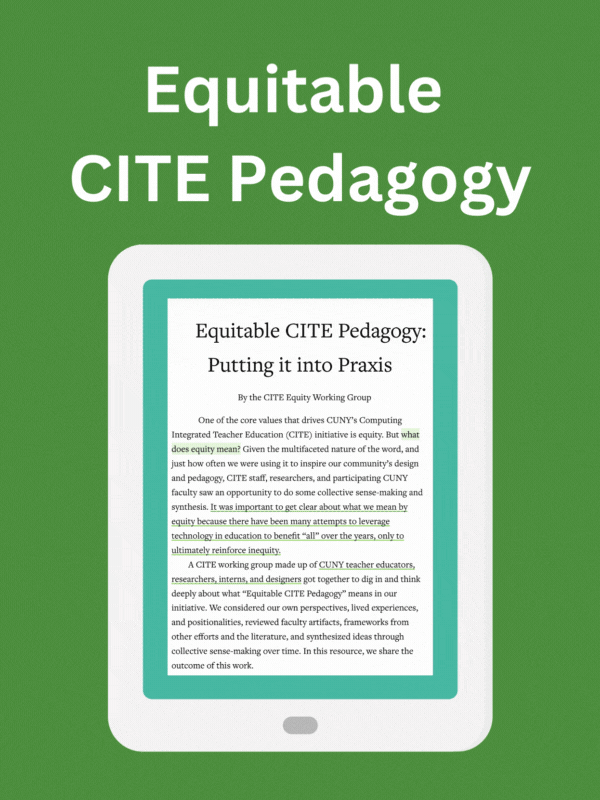
I co-facilitated a working group focused on defining what it would mean to equitably integrate computing and digital literacies into teacher education pedagogy.
The CUNY CITE Equity Working Group. (2023). Equitable CITE Pedagogy: Putting it into Praxis. City University of New York – Computing Integrated Teacher Education. https://cuny.manifoldapp.org/read/equitable-cite-pedagogy-putting-it-into-praxis
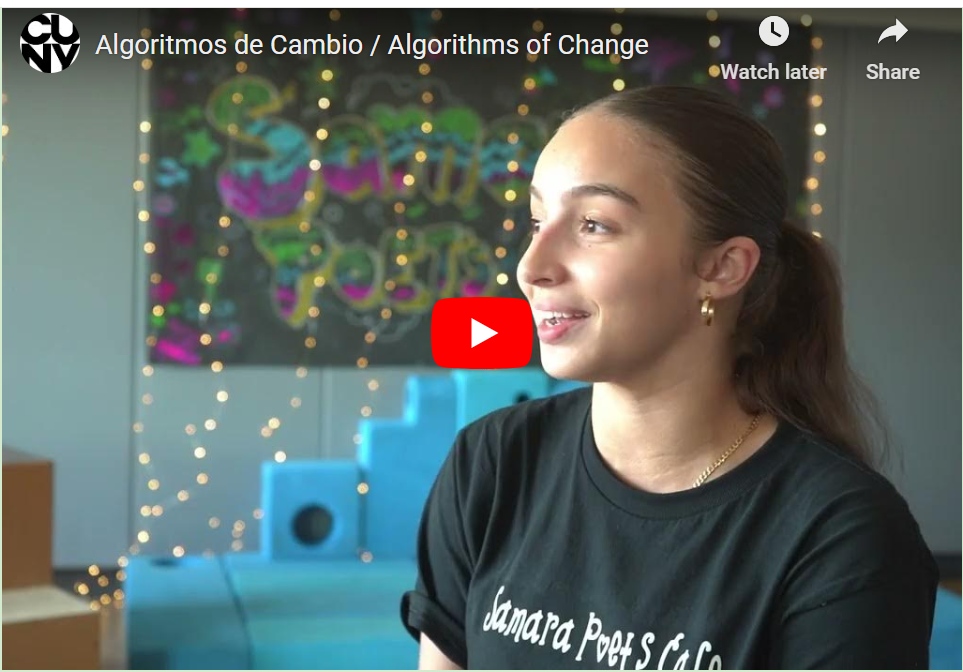
I worked with colleagues at CUNY CITE to produce videos about teacher candidates’ journeys into teaching and learning about, with, through, and against computing and digital literacies.
See videos here.
Bi/multilinguals and Computational Literacies
Empirical and Theoretical Foundations
Dissertation work: Vogel, S. (2020). Translanguaging About, With, and Through Code and Computing: Emergent Bi/multilingual Middle Schoolers Forging Computational Literacies [The Graduate Center of the City University of New York]. https://academicworks.cuny.edu/gc_etds/3963/
Radke, S. C., Vogel, S. E., Ma, J. Y., Hoadley, C., & Ascenzi-Moreno, L. (2022). Emergent Bilingual Middle Schoolers’ Syncretic Reasoning in Statistical Modeling. Teachers College Record, 124(5). https://journals.sagepub.com/doi/full/10.1177/01614681221104141
Vogel, S. (2021). “Los programadores debieron pensarse como dos veces”: Exploring the Intersections of Language, Power and Technology with Bi/Multilingual Students. ACM Transactions on Computing Education, Special Issue on Justice-centered Computing Education. http://dx.doi.org/10.1145/3447379
Vogel, S., Hoadley, C., Castillo, A. R., & Ascenzi-Moreno, L. (2020). Languages, literacies, and literate programming: Can we use the latest theories on how bilingual people learn to help us teach computational literacies? Computer Science Education. http://dx.doi.org/10.1080/08993408.2020.1751525
Resources for Practitioners
Participating in Literacies and Computer Science Website
- Videos
- Educator resources and case studies
- Collaborative Research
Ascenzi-Moreno, L., Guilamo, A., & Vogel, S. (2020). Integrating Coding and Language Arts: A View into Sixth Graders’ Multimodal and Multilingual Learning. Voices from the Middle, National Council of Teachers of English, 27(4). [Access through NSF PAR]
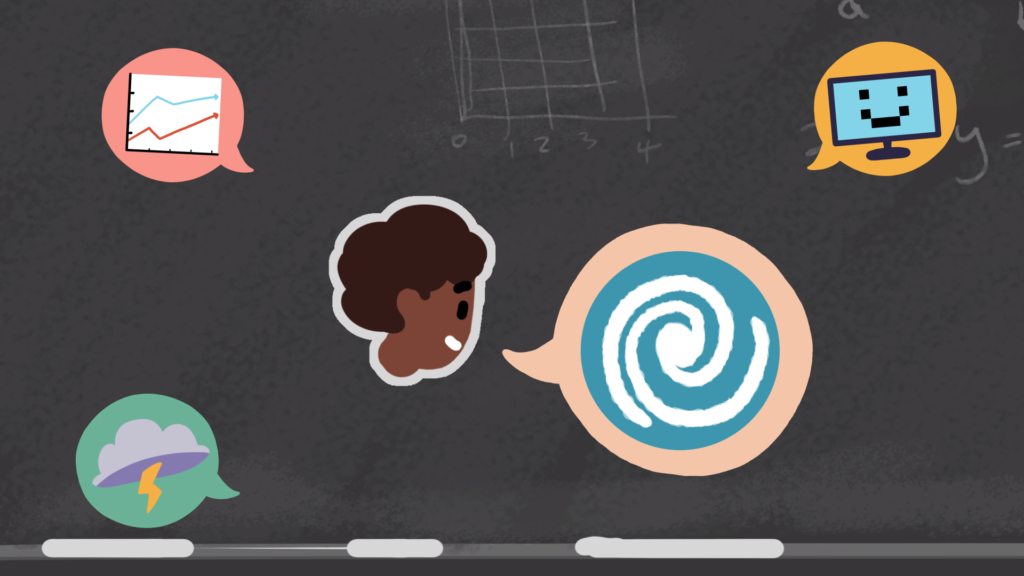
Teacher Education Courses Designed and Taught
The Graduate Center, CUNY
- Interactive Technology and Pedagogy, Core II
Bank Street College
- Computing For What? Exploring CS Education Visions for School Environments – Asynchronous Online Module
- Supervised Fieldwork and Conference Group – TESOL Residency
- TESL 563: The Teaching of Reading, Writing, & Language Arts in ENL Settings (PreK-12)
- TESL 660: TESOL Research & Methodologies (Grades PreK-6)
- EDUC 505: Language Learning and Acquisition in a Linguistically Diverse Society
Hunter College, City University of New York
- Foundations of Bilingual Education
School of Professional Studies, City University of New York
- Sociology of Education
- Capstone Adviser
Syllabi samples available upon request